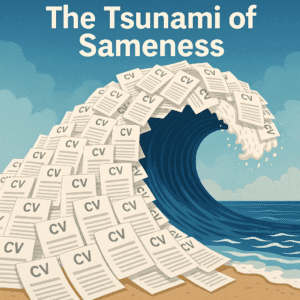Go on, admit it, you’re hooked. Sixteen words in and already he’s got you in a brain-lock. What exactly has Steve Jobs, that Mahatma Gandhi-lookalike in a turtleneck, been looking forward to for not one, not two, but a full two and a half years? We’re about to find out:
“Every once in a while, a revolutionary product comes along that changes everything. And Apple has been – well, first of all, one’s very fortunate if you get to work on just one of these in your career.
Apple’s been very fortunate. It’s been able to introduce a few of these into the world. In 1984, we introduced the Macintosh. It didn’t just change Apple; it changed the whole computer industry.”
It’s at this point that the video shows the audience starting to whoop and applaud. It’s as if Elvis has re-entered the building clutching an Apple Mac. Despite the minimalist stage set and the studied casualness of the presenter, the excitement is at fever pitch.
“Well, today, we’re introducing three revolutionary products of this class. The first one is a widescreen iPod with touch controls. The second is a revolutionary mobile phone. And the third is a breakthrough Internet communications device.”
So, three things: a widescreen iPod with touch controls; a revolutionary mobile phone; and a breakthrough Internet communications device.
An iPod, a phone, and an Internet communicator. An iPod, a phone … Are you getting it? These are not three separate devices, this is one device, and we are calling it iPhone. Today, today Apple is going to reinvent the phone.”
If you haven’t watched it, you can catch it online. This was a speech given by Steve Jobs in January 2007 at the San Francisco Macworld convention. It’s since been heralded as one of the greatest speeches ever given by a business leader. Admittedly, the bar wasn’t set too high.
Watching it again ten years on, the first thing that strikes you is the hype. BC (before computers) CEOs didn’t act or talk like this. And they certainly didn’t wear jeans and white trainers. Imagine old Henry Heinz standing up and announcing, “Baked beans, tomato sauce, a can. Baked beans, tomato sauce, a can … Are you getting it? Today, Heinz reinvents the baked bean.”
But in Jobs’ defence, the hype turned out to be justified. Last year, sales of iPhones topped one billion. Jobs’ prediction about reinventing the phone proved spot on. If anything, he was underselling it. What no one at the time realised, however, was that once unleashed, the dogs of invention weren’t about to go back in their kennels.
Recently, I have been discussing the impact of the iPhone with students. For them, phones have always been smart, have always been mobile. The iPhone and its ilk are as ubiquitous for their generation as TV and radio were for their parents.’
But if technology is neither good nor bad, it’s definitely not neutral. What no one in 2007 realised was that Jobs’ invention would go on to transform not just the computing industry, but also the worlds of higher education and graduate recruitment.
As we mark the tenth anniversary of Steve Jobs’ Macworld speech, here are five ways that the iPhone has changed the world of work as many of us now know it.
1. End of intermediaries
Pre-smart phone, the only way to access the Internet was via a desktop computer. From 2007 onwards, the internet became personal and portable. You carried it in your pocket.
This apparently minor detail empowered people – particularly the young – in ways that would have been unimaginable to earlier generations. It was like Gutenberg’s press, but pocket-sized and infinitely more powerful.
It also sounded the death knell for any intermediary that traded by offering a gateway to information.
In universities, the early casualties were the careers libraries. The iPhone led to a holocaust of lever-arch files, information booklets and employer brochures. From then on, recruiters and potential hires could liaise with one another unimpeded and without the need of a digital chaperone.
2. Apps
Since 2007, 140 billion apps have been downloaded from Apple’s iTunes store. In turn, millions of apps have been developed for almost every conceivable function, including of course, graduate recruitment. An entire industry of app designers, web managers, media buyers and e-commerce specialists has been created. It’s also created a new and thriving graduate recruitment industry in cyber security.
3. Social media
Although social media existed prior to 2007, smart phones turned it into a mass communication channel. Once you had a smart phone, no matter where you were or what you were doing, you were never more than a screen tap away from your ‘friends’. And yes, that includes lecture theatres.
4. Blurring of work and leisure
Pre-smart phones, there was no way you could take your Sony Walkman into a boardroom. In those days, work and leisure were clearly demarcated. But with an iPhone, your work emails sit seamlessly alongside your music library and your family photos. In Jobs’ ‘i-world’, work time blurs seamlessly with leisure time, and of course, vice versa.
5. Virtual reality
As anyone who has observed a room full of university students waiting for a lecture to begin will testify, thanks to smart phones, reality is fast becoming less interesting than the story told about it later. In other words by connecting us to the world digitization risks disconnecting us from the people next to us. We’re all together and thanks to our handheld devices, all alone.
An iPod, a phone, an internet communicator … Are you getting it?






